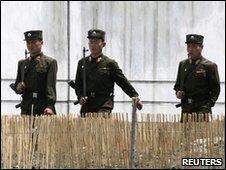North Korea 'severs all ties' with Seoul
- Published

Pyongyang said all ties, including communications, would be cut
North Korea is to cut all relations with South Korea, Pyongyang's official news agency reports.
KCNA said the North was also expelling all South Korean workers from a jointly-run factory north of the border.
The move comes after an international report blamed North Korea for sinking a South Korean warship.
Pyongyang denies it torpedoed the Cheonan near the inter-Korean maritime border on 26 March, killing 46 sailors.
South Korea says it plans to refer North Korea to the UN Security Council, and is seeking a unified international response to the incident.
'Puppet army gangs'
Tuesday's KCNA reports announcing the severing of all ties - including communications - said the North was also banning South Korean ships and planes from its territorial waters and airspace.
"The Committee for the Peaceful Reunification of Korea... formally declares that from now on it will put into force the resolute measures to totally freeze the inter-Korean relations, totally abrogate the agreement on non-aggression between the North and the South and completely halt the inter-Korean cooperation," KCNA reported.
Pyongyang has also accused South Korea of trespassing in its waters.
In a warning to South Korea's navy, a newsreader on North Korean state television (KRT) said: "South Korean puppet army gangs have been recently trespassing our territorial waters without restraint.
"They have conducted provocative acts which severely irritate us, by making dozens of warships intrude upon our waters from 14 to 24 May."
The newsreader said that if this "deliberate provocation" continued, the North would "put into force practical military measures to defend its waters".
North and South Korea are technically still at war after the Korean conflict ended without an armistice in 1953.
While there were hopes of a reconciliation a few years ago, relations have been deteriorating since then and now appear to be at their lowest point in a decade, correspondents say.
Provocation
Amid the rising tensions, Seoul announced on Sunday it was ending trade relations with the North in response to the sinking of the Cheonan.
South Korea has also said it will drop propaganda leaflets into the North to tell people about the sinking, as well as setting up giant electronic billboards to flash messages.
It has resumed propaganda broadcasts to the North, playing radio programmes that will soon be broadcast via border loudspeakers.
The US, which has thousands of troops based in South Korea, has backed Seoul, condemning the incident and confirming late on Monday that it will hold joint anti-submarine naval exercises with South Korean forces.
US Secretary of State Hillary Clinton has said the US and China must work together to "fashion an effective response" to the sinking of the Cheonan.
Speaking in Beijing, Mrs Clinton said maintaining peace on the Korean peninsula was "a shared responsibility" between the countries.
China has called for all sides to show restraint, adding its voice to calls for international co-operation over the incident.
Vice Foreign Minister Cui Tiankai said Beijing was "ready to work together with the US and other parties and continue to stay in close touch on the situation on the Korean peninsula".
On Tuesday Wu Dawei, China's special representative for Korean affairs, arrived in Seoul for talks with Foreign Minister Yu Myung-hwan.
Analysts say China's attitude is key, because it holds a veto in the Security Council and has in the past been reluctant to impose tough measures on Pyongyang.
Mrs Clinton is also due in Seoul for talks on Wednesday.